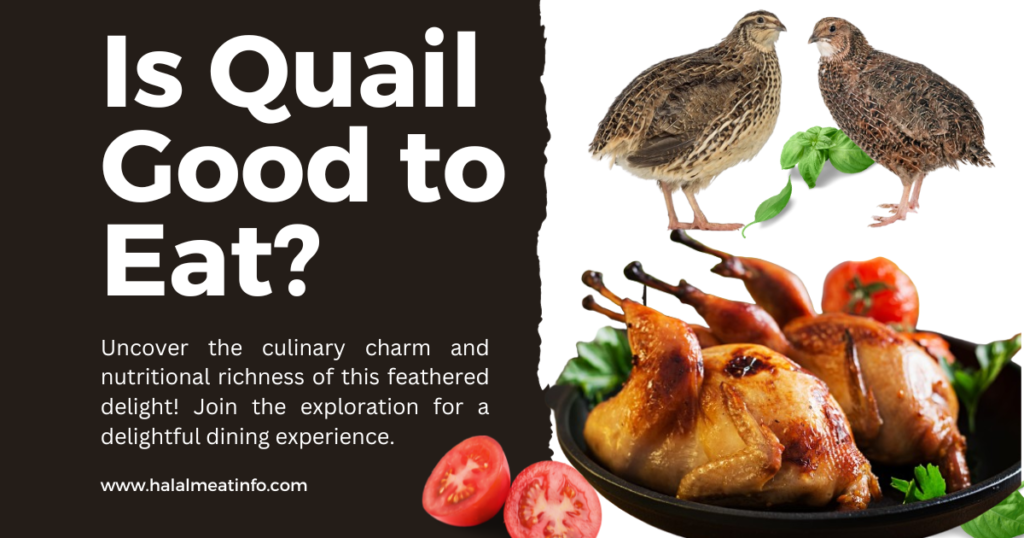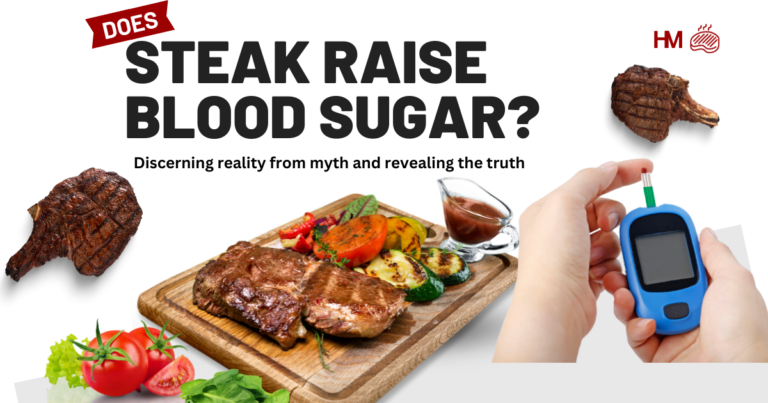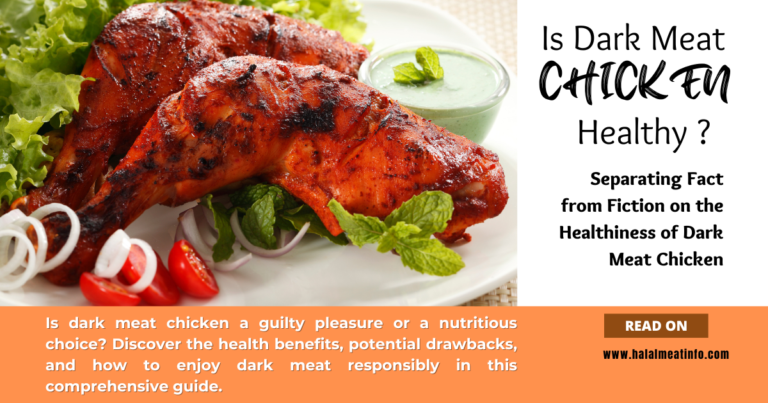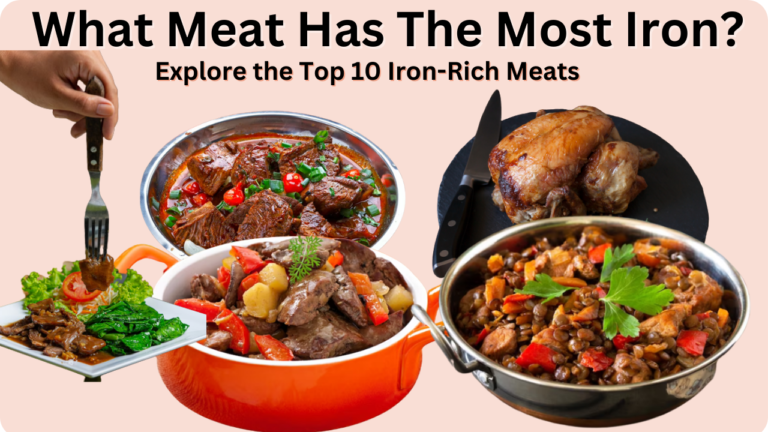Is Quail Good to Eat? Exploring the Culinary Delights and Health Benefits
Quail, a delicacy enjoyed worldwide, often raises the question, “Is quail good to eat?” This blog post delves into the nutritional aspects of this bird, its taste, and the culinary versatility it offers. Read on to explore the world of quail as food and why it’s a favored choice for many gourmands.
Quail, a petite game bird, belongs to the Phasianidae family. While it may not be as popular as chicken or turkey, quail meat has been gaining attention in recent years for its unique flavor and potential health benefits. In this article, we will explore whether quail is good to eat and what makes it a worthwhile addition to your diet.

Meet the Quail Birds
Quail birds, small yet mighty, are a culinary delight for epicureans worldwide. Found in parts of Europe, Asia, Africa, and the Americas, these birds are as diverse in variety as they are in flavor. Quails, often found in grassy fields or farmland, are ground-nesting birds. They’re known for their distinctive “bobwhite” call, a melody that echoes through their natural habitats. Despite their small size, quail birds pack various nutrients, making them a healthful and tasty option.
What is Quail Meat?
Quail meat comes from the small, game bird known as quail. Averaging between 4 to 7 ounces in weight, these birds may be tiny, but they pack a punch when it comes to nutritional value and flavor. Quail meat boasts a distinctive, slightly gamey taste, setting it apart from other poultry. Beyond its distinctive flavor, it’s noteworthy for its health benefits. This lean meat is chock-full of protein and boasts an impressive array of essential vitamins and minerals. Not to be overlooked, it also has less saturated fat than many other meats, making it an excellent choice for those mindful of their diet. Indeed, quail meat isn’t just good to eat, but it also contributes to a balanced, healthful eating plan [1].
The Rising Popularity of Quail Meat
Quail meat, once overlooked in favor of more traditional poultry, is now making its mark on the gastronomic scene. Its unique flavor distinguishes it from other meats. Cooks appreciate its tender, moist texture that lends itself well to a variety of culinary techniques. But the appeal of quail extends beyond just taste. It’s a protein-packed, nutrient-dense meat, rich in vital vitamins and minerals. It’s also lower in saturated fat than many other meats, making it a favorite among health-conscious individuals. As people increasingly seek out diverse, high-quality food options, it’s no surprise quail meat is in the spotlight [2].
Nutritional Value of Quail
Quail offers a nutritional punch, making it a smart choice for a balanced diet. First, let’s talk about protein. Quail meat is a lean source of high-quality protein, essential for muscle growth and repair. Each serving of quail delivers a good portion of your daily protein needs, supporting overall health.
Moving onto vitamins and minerals, quail is a powerhouse. It’s rich in vitamin B complex, specifically B2 (riboflavin) and B12, vital for energy production and red blood cell formation. You also get a good dose of iron, phosphorus, and zinc, contributing to a robust immune system and strong bones.
Lastly, quail doesn’t disappoint when it comes to healthy fats. It contains monounsaturated and polyunsaturated fats, the so-called “good” fats. These fats help lower bad cholesterol levels, reducing the risk of heart disease. So, quail not only tastes great, but it’s also nutritionally robust [3].
For more information about the unique and distinctive flavor profile of quail, check out this comprehensive guide on what does quail taste like. It provides insightful details that can help you better understand and appreciate this gourmet bird’s culinary potential.
Is Quail Meat Good For Health
Beyond its robust nutritional content, quail provides specific health advantages.
Heart Health
Quail is heart-friendly. It contains monounsaturated and polyunsaturated fats. These “good” fats can help lower low-density lipoprotein, the harmful cholesterol. By doing so, it may aid in reducing the risk of heart disease.
Digestive Health
Quail’s high protein content supports digestive health, vital for maintaining and repairing body tissues, including those in the digestive tract. Thus, including quail in your diet could support your digestive health.
Eye Health
Quail also benefits your vision. It’s replete with vitamin A and riboflavin, both known for promoting eye health. Incorporating quail into your diet could help enhance vision and mitigate the risk of eye-related health issues.
Potential Risks and Allergies: What You Should Know
While quail offers numerous health benefits, it’s essential to be aware of potential food safety concerns and allergenic reactions.
Food Safety Concerns with Quail
Like other poultry, quail carries a risk of foodborne illnesses, especially if not cooked to a safe internal temperature. Consuming undercooked quail can lead to illnesses such as salmonella or Campylobacter infection. Symptoms can include fever, stomach pain, diarrhea, and vomiting. To ensure safety, always cook quail to an internal temperature of 165°F.
Allergenic Reactions to Quail
People with bird-egg syndrome, a rare allergy, may react to quail. This syndrome is an allergic reaction to proteins found in the egg yolks of several bird species, including quail. If allergic to chicken eggs, there might be a similar reaction to quail eggs. Symptoms range from mild, like hives, to severe, like anaphylaxis. If suspecting an allergy, seek medical advice before consuming quail.
What Age Can You Eat Quail?
Quail meat is a nutritious and versatile food that can be included in the diet at various stages of life. Children, in general, can start to consume quail meat once they are introduced to solids, typically around 6 months of age. However, it is always essential to ensure the meat is thoroughly cooked to a safe internal temperature of 165°F to avoid any potential foodborne illnesses. For those with a known history of allergies, especially to eggs, it would be wise to consult a healthcare professional before introducing quail into their diet. Adults and seniors can enjoy quail meat without any age restrictions, given its high protein content and low fat, it serves as a great addition to a balanced diet.
Can You Eat Quail Everyday?
Eating quail every day is entirely feasible but should be done in moderation, as part of a balanced diet. Quail meat, packed with essential nutrients, is a beneficial addition to your daily meals. However, as with any food, variety is key to ensuring a balanced intake of different nutrients. Incorporating diverse protein sources, such as fish, other types of poultry, or plant-based proteins, can help maintain a well-rounded diet. While offering numerous health benefits, individuals with specific allergies or dietary restrictions should consult healthcare professionals before incorporating quail into their diet.
How Do You Eat Quail?
Quail, a versatile meat, fits seamlessly into various cuisines. Its tender flesh and unique taste enhance various dishes. You can grill, roast, bake, or even fry quail based on your preference. Grilled or roasted quail, marinated with herbs and spices, can be a standout main course. Quails can also be stuffed with ingredients like wild rice or mushrooms. Baking quail with a glaze offers a sweet contrast to its gamey flavor. For a crispy treat, you can bread and deep-fry quail. Remember to ensure it’s cooked to a safe internal temperature of 165°F to avoid foodborne illnesses. Whether it’s a fancy dinner or a weekday meal, quail is a culinary delight that can be enjoyed in various ways.
Can You Eat Quail Bones?
Eating quail bones might seem unusual, but it’s not uncommon. Quail bones are small, tender, and softer than chicken or turkey bones. In many culinary traditions, cooked quail is often consumed whole, bones included. The bones are typically soft enough to chew and swallow without discomfort, making them an acceptable part of the meal. However, caution is necessary, particularly for children or those with swallowing difficulties, to avoid the risk of choking. Always eat mindfully and chew well. If in doubt, it’s perfectly fine to remove the bones before eating.
Can You Eat Quail Raw?
The consumption of raw quail is not generally recommended due to the risk of foodborne illnesses. Like other types of poultry, raw quail can harbor bacteria such as Salmonella and Campylobacter [4]. When consumed raw or undercooked, these bacteria can cause serious illnesses with symptoms ranging from diarrhea and stomach pain to fever and vomiting. To ensure safety, quail must be cooked to an internal temperature of 165°F. This kills off any harmful pathogens, making the meat safe to eat. So, while raw quail might be tempting to some culinary adventurers, it’s best to play it safe and enjoy this bird thoroughly cooked.
Eating Quail Meat During Pregnancy: Safety and Nutritional Considerations
When you’re expecting, diet plays a critical role in both mother and baby’s health. Quail meat, with its rich protein content and essential nutrients, may seem like a good choice. Safety is paramount. Like all poultry, quail meat should reach an internal temperature of 165°F to eliminate harmful bacteria, crucial to prevent foodborne illnesses, especially during pregnancy. As long as it’s well-cooked, quail can be a healthful addition to a balanced, nutrient-dense pregnancy diet. Remember, though, to always consult with a healthcare professional or dietitian to ensure that any dietary changes during pregnancy are safe and beneficial for you and your baby [5].
Environmental Impact of Quail Farming: A Comprehensive Examination
Quail farming carries a relatively smaller footprint on the environment compared to other forms of poultry farming. This is largely due to the quail’s small size, fast growth rate, and efficient feed conversion. Quails require less space, consume less food, and produce less waste, which collectively contributes to a reduced environmental impact.
Sustainability of Quail Farming
Sustainability is a key strength of quail farming. Quails have a quick reproduction cycle, with hens able to lay eggs at just six weeks of age. This rapid turnover allows for efficient and sustainable production. Moreover, quail farming requires less water and feed resources compared to other poultry farming, making it a more sustainable choice.
Impact on Biodiversity and Habitats
Quail farming, if done responsibly, can coexist with local ecosystems without causing significant harm to biodiversity and habitats. However, like any farming practice, it requires careful planning and management. It’s crucial to ensure that quail farms do not encroach on natural habitats and that waste from farms is appropriately managed to prevent pollution and habitat destruction. With appropriate measures, quail farming can serve as a sustainable protein source with minimal environmental impact.
Versatile Culinary Ingredient: Quail in the Kitchen
Quail meat isn’t just nutritious, it’s also a versatile ingredient in the culinary world. Its mild, slightly gamey flavor is a standout in many dishes, pairing well with a range of flavors. Whether grilled, roasted, or used in stews, quail can impress in any course. Quail eggs too, with their rich, creamy yolk, bring a gourmet touch to appetizers and salads. From Italian risotto to Japanese yakitori, quail has a special place in diverse cuisines worldwide. Its versatility makes it an exciting ingredient for culinary experiments. So, next time you’re planning a meal, consider quail—it could turn an ordinary dish into a gourmet delight.
FAQs
Yes, quail meat is a good source of essential nutrients, such as protein, iron, and Vitamin B.
Yes, quail bones are small and tender enough to be consumed. However, mindful eating is necessary to avoid choking.
No, raw or undercooked quail may contain harmful bacteria. Ensure the meat is cooked to an internal temperature of 165°F for safety.
Yes, but thorough cooking to an internal temperature of 165°F is crucial. Always consult healthcare professionals before dietary changes in pregnancy.
Yes, quail farming has a smaller environmental footprint than other poultry farming due to the quail’s small size and efficient resource utilization. However, proper management is essential to minimize its impact on biodiversity and habitats.
Quail meat and eggs are versatile ingredients that can be grilled, roasted, or used in stews and other dishes. Quail’s distinct taste complements a variety of flavors, making it a favored option in global cuisines.
Conclusion
Quail, as a dietary component, presents an array of benefits. It’s nutrient-rich, offering a good source of protein, iron, and Vitamin B. With careful cooking and mindful consumption, it can be consumed safely, even during pregnancy. Its farming methods boast environmental sustainability, and in the kitchen, quail’s versatility shines. Used in various culinary traditions, it lends a unique flavor to dishes. So, whether for health, environmental consciousness, or culinary exploration, quail merits consideration. Always consult healthcare professionals before making significant dietary changes.






